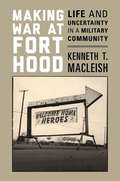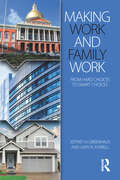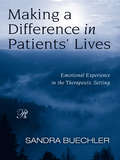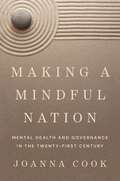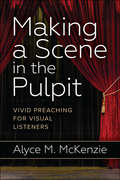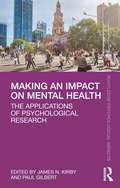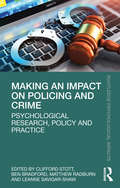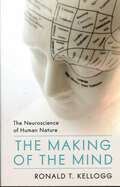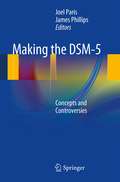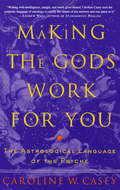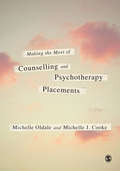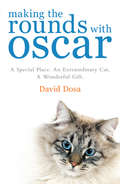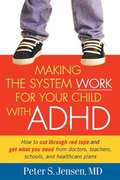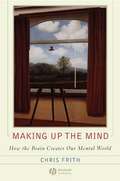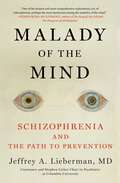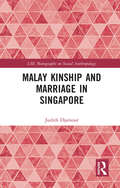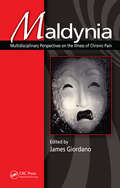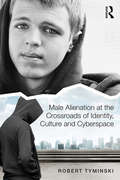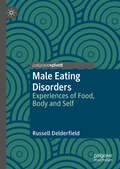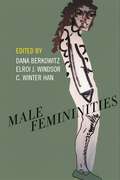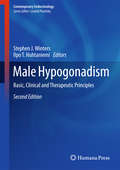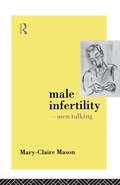- Table View
- List View
Making War at Fort Hood: Life and Uncertainty in a Military Community
by Kenneth T. MacLeishAn intimate look at war through the lives of soldiers and their families at Fort HoodMaking War at Fort Hood offers an illuminating look at war through the daily lives of the people whose job it is to produce it. Kenneth MacLeish conducted a year of intensive fieldwork among soldiers and their families at and around the US Army's Fort Hood in central Texas. He shows how war's reach extends far beyond the battlefield into military communities where violence is as routine, boring, and normal as it is shocking and traumatic.Fort Hood is one of the largest military installations in the world, and many of the 55,000 personnel based there have served multiple tours in Iraq and Afghanistan. MacLeish provides intimate portraits of Fort Hood's soldiers and those closest to them, drawing on numerous in-depth interviews and diverse ethnographic material. He explores the exceptional position that soldiers occupy in relation to violence--not only trained to fight and kill, but placed deliberately in harm's way and offered up to die. The death and destruction of war happen to soldiers on purpose. MacLeish interweaves gripping narrative with critical theory and anthropological analysis to vividly describe this unique condition of vulnerability. Along the way, he sheds new light on the dynamics of military family life, stereotypes of veterans, what it means for civilians to say "thank you" to soldiers, and other questions about the sometimes ordinary, sometimes agonizing labor of making war.Making War at Fort Hood is the first ethnography to examine the everyday lives of the soldiers, families, and communities who personally bear the burden of America's most recent wars.
Making Work and Family Work: From hard choices to smart choices
by Gary N. Powell Jeffrey H. GreenhausMaking Work and Family Work investigates the difficult choices that contemporary employees must face when juggling work and family with a view to identifying the smart choices that all parties involved—society, employers, employees and families—should make to promote greater work–life balance. Leading scholars Jeffrey Greenhaus and Gary Powell begin by identifying the factors that work against an employee’s ability to be effective and satisfied in their work and family roles. From there, they examine a variety of factors that impact the decision-making process that employees and their families can use to enhance employees’ feelings of work-family balance and families’ well-being. Covering a comprehensive set of topics and perspectives, this fascinating book will appeal to upper-level students of human resource management, organizational behavior, industrial/organizational psychology, sociology, and economics, as well as to thoughtful and engaged professionals.
Making a Difference in Patients' Lives: Emotional Experience in the Therapeutic Setting (Psychoanalysis in a New Key Book Series)
by Sandra BuechlerWinner of the 2009 Gradiva Award for Outstanding Psychoanalytic Publication! Within the title of her book, Making a Difference in Patients' Lives, Sandra Buechler echoes the hope of all clinicians. But, she counters, experience soon convinces most of us that insight, on its own, is often not powerful enough to have a significant impact on how a life is actually lived. Many clinicians and therapists have turned toward emotional experience, within and outside the treatment setting, as a resource. How can the immense power of lived emotional experience be harnessed in the service of helping patients live richer, more satisfying lives? Most patients come into treatment because they are too anxious, or depressed, or don’t seem to feel alive enough. Something is wrong with what they feel, or don’t feel. Given that the emotions operate as a system, with the intensity of each affecting the level of all the others, it makes sense that it would be an emotional experience that would have enough power to change what we feel. But, ironically, the wider culture, and even psychoanalysts, seem to favor "solutions" that aim to mute emotionality, rather than relying on one emotion to modify another. We turn to pharmaceutical, cognitive, or behavioral change to make a difference in how life feels. Because we are afraid of emotional intensity, we cut off our most powerful source of regulation. In clear, jargon-free prose that utilizes both clinical vignettes and excerpts from poetry, art, and literature, Buechler explores how the power to feel can become the power to change. Through an active empathic engagement with the patient and an awareness of the healing potential inherent in each of our fundamental emotions, the clinician can make a substantial difference in the patient’s capacity to embrace life.
Making a Mindful Nation: Mental Health and Governance in the Twenty-First Century
by Joanna CookHow mindfulness came to be regarded as a psychological support, an ethical practice and a component of public policyMindfulness seems to be everywhere—in popular culture, in therapeutic practice, even in policy discussions. How did mindfulness, an awareness training practice with roots in Buddhism, come to be viewed as a solution to problems that range from depression and anxiety to criminal recidivism? If mindfulness is the answer, asks Joanna Cook, what is the question? In Making a Mindful Nation, Cook uses the lens of mindfulness to show how cultivating a relationship with the mind is now central to the ways people envision mental health. Drawing on long-term fieldwork with patients, therapists, members of Parliament and political advocates in Britain, Cook explores how the logics of preventive mental healthcare are incorporated into people’s relationships with themselves, therapeutic interventions, structures of governance and political campaigns.Cook observed mindfulness courses for people suffering from recurrent depression and anxiety, postgraduate courses for mindfulness-based therapists, parliamentarians’ mindfulness practice and political advocacy for mindfulness in public policy. She develops her theoretical argument through intimate and in-depth stories about people’s lives and their efforts to navigate the world—whether these involve struggles with mental health or contributions to evolving political agendas. In doing so, Cook offers important insights into the social processes by which mental health is lived, the normative values that inform it and the practices of self-cultivation by which it is addressed.
Making a Psychopath: My Journey into Seven Dangerous Minds
by Mark FreestoneFind out what truly creates and defines a psychopath, from the leading expert who helped to create Killing Eve's Villanelle.Dr. Mark Freestone has worked on some of the most interesting, infamous and disturbing cases of psychopathology in recent years. His expertise has led to a consultant role on several TV series, helping them accurately portray their fictional villains. Now, he shares his phenomenal insight into the minds of some of the world's most violent real-life criminals.Angela "the Remorseless", a rare female psychopath, casually confessed to murder on national television without a hint of regret. Danny "the Borderline" switched from grandiosity to rage to despair within minutes and killed his defenseless friend without explanation. Tony "the Conman" preferred charm, intimidation and sexual abuse over physical violence and once tried to dupe someone into buying the Eiffel Tower. Jason "the Liar" had a fantasy life that led to vicious murders around Europe and preyed on those who see the good in people. Case by fascinating case, get to know seven of the most dangerous minds that Dr. Freestone has encountered over the last 15 years. These are up-close accounts of some of the most psychopathic criminals, and of what can happen if you fall victim to their supreme powers of manipulation.Exploring the many factors that make a psychopath, the complexities and contradictions of their emotions and behavior, as well as an examination of how the lives of psychopaths develop inside and outside the institutions that are supposed to contain them, Making a Psychopath opens up a window into the world of those who operate in a void of human emotion—and what can be done to control them.
Making a Scene in the Pulpit: Vivid Preaching For Visual Listeners
by Alyce McKenzieHow can preachers ensure that their sermons continue to engage listeners in a world defined by visual media and the short, segmented delivery of information? Alyce McKenzie harnesses the element of drama and the human fascination with scenes to offer ministers a modern means of sermon development and delivery. <P><P> McKenzie's core strategy is to invite listeners into scenes—whether from Scripture or contemporary life—and, once they are there, to point them toward the larger story of God's relationship with humankind. Creating such scenes unifies the whole process of preaching, she says, from the preacher's daily life observations to interpretation of scenes from Scripture, to sermon shaping, sequencing, and delivery. The process culminates in a specific understanding of the purpose of the sermon: to send listeners out into the scenes they'll play in their lives for the next week, equipped to act out their parts in ways that are kinder, more just, and more courageous than last week.
Making an Impact on Mental Health: The Applications of Psychological Research (Routledge Psychological Impacts)
by James N. KirbyAdvancements in research in psychological science have afforded great insights into how our minds work. Making an Impact on Mental Health and Illness analyses contemporary, international research to examine a number of core themes in mental health, such as mindfulness and attachment, and provides an understanding of the sources of mentally ill health and strategies for remediation. The originality of this work is the embedding of psychological science in an evolutionary approach. Each chapter discusses the context of a specific research project, looking at the methodological and practical challenges, how the results have been interpreted and communicated, the impact and legacy of the research and the lessons learnt. As a whole, the book looks at how social environments shape who we are and how we form relationships with others, which can be detrimental, but equally a source of flourishing and well-being. Covering a range of themes conducive to understanding and facilitating improved mental health, Making an Impact on Mental Health and Illness is invaluable reading for advanced students in clinical psychology and professionals in the mental health field.
Making an Impact on Policing and Crime: Psychological Research, Policy and Practice (Routledge Psychological Impacts)
by Clifford Stott, Ben Bradford, Matthew Radburn and Leanne Savigar-ShawMaking an Impact on Policing and Crime: Psychological Research, Policy and Practice applies a range of case studies and examples of psychological research by international, leading researchers to tackle real-world issues within the field of crime and policing. Making an Impact on Policing and Crime documents the application of cutting-edge research to real-world policing and explains how psychologists’ insights have been adapted and developed to offer effective solutions across the criminal justice system. The experts featured in this collection cover a range of psychological topics surrounding the field, including the prevention and reduction of sexual offending and reoffending, the use of CCTV and ‘super-recognisers’, forensic questioning of vulnerable witnesses, the accuracy of nonverbal and verbal lie detection interview techniques, psychological ‘drivers’ of political violence, theoretical models of police–community relations, and the social and political significance of urban ‘riots’. This collection is a vital resource for practitioners in policing fields and the court system and professionals working with offenders, as well as students and researchers in related disciplines.
Making an Impact on School Bullying: Interventions and Recommendations (Routledge Psychological Impacts)
by Peter K. SmithExploring international and intercultural perspectives, Making an Impact on School Bullying presents a much-needed insight into the serious problem of bullying in schools. As the effect of bullying on victims can be devastating, and bystanders and even perpetrators are often also negatively affected by the experience, finding successful solutions to the problem of bullying is crucial for improving school life around the world. This invaluable book looks at a range of practical interventions that have addressed the problem of school bullying. Peter Smith presents a curated collection of seven examples of successful anti-bullying procedures from around the world - including the US, Europe and Asia - and an exploration of cyberbullying. Each chapter examines the context in which the interventions took place, how theoretical knowledge transferred into practice, and the impact and legacy of the work. Covering the most important and widely-used strategies to combat bullying, the book provides readers with a roadmap to developing practical and impactful interventions. Ideal reading for students and researchers of education and developmental psychology, Making an Impact on School Bullying is also useful for school counsellors and education authorities.
Making of the Mind: The Neuroscience of Human Nature
by Ronald T. KelloggUsing the findings of recent neuroscience, a psychologist reveals what sets humans apart from all other species, offering a fascinating exploration of our marvelous and sometimes frightening cognitive abilities and potentials. According to human genome research, there is a remarkable degree of overlap in the DNA of humans and chimpanzees. So what accounts for the rapid development of human culture throughout history and the extraordinary creative and destructive aspects of human behavior that make us so different from our primate cousins? Kellogg explores in detail five distinctive parts of human cognition. These are the executive functions of working memory; a social intelligence with "mind-reading" abilities; a capacity for symbolic thought and language; an inner voice that interprets conscious experiences by making causal inferences; and a means for mental time travel to past events and imagined futures. He argues that it is the interaction of these five components that results in our uniquely human mind. This is especially true for three quintessentially human endeavors-morality, spirituality, and literacy, which can be understood only in light of the whole ensemble's interactive effects. Kellogg recaps the story of the human mind and speculates on its future. How might the Internet, 24/7 television, and smart phones affect the way the mind functions?
Making the DSM-5
by Joel Paris James PhillipsIn 2013, the American Psychiatric Association published the 5th edition of its Diagnostic and Statistical Manual of Mental Disorders (DSM-5). Often referred to as the "bible" of psychiatry, the manual only classifies mental disorders and does not explain them or guide their treatment. While science should be the basis of any diagnostic system, to date, there is no knowledge on whether most conditions listed in the manual are true diseases. Moreover, in DSM-5 the overall definition of mental disorder is weak, failing to distinguish psychopathology from normality. In spite of all the progress that has been made in neuroscience over the last few decades, the psychiatric community is no closer to understanding the etiology and pathogenesis of mental disorders than it was fifty years ago. In Making the DSM-5, prominent experts delve into the debate about psychiatric nosology and examine the conceptual and pragmatic issues underlying the new manual. While retracing the historic controversy over DSM, considering the political context and economic impact of the manual, and focusing on what was revised or left unchanged in the new edition, this timely volume addresses the main concerns of the future of psychiatry and questions whether the DSM legacy can truly improve the specialty and advance its goals.
Making the Gods Work for You
by Caroline W. CaseyBelieve Nothing, Entertain Possibilities! Making the Gods Work for You presents internationally renowned author Caroline W. Casey's remarkable doctrine of Visionary Activist Astrology. In this reverently irreverent mystery school disguised as a book (in which each of the planetary gods is a professor), we are invited to think of our lives as a spiritual detective novel. For example, Venus teaches us that our affinities and quirks are clues to our unique mission and contribution to the world. The astrological language of the psyche is a tool for deciphering and revitalizing this sense of mission. Casey teaches you how to expand your range of intimacy with the ten parts of yourself represented by the planets, here called gods. You will learn how to use this language to reverence and feed the forces of your psyche that connect you to very real external forces. This book intends to catalyze a movement to engage the imagination of all people with a sense of humor and a desire to do collaborative good in the world. Expanding on the ideas first presented in her popular audiotape series, Inner and Outer Space, Casey explores the archetypes at the heart of human relationships, aspirations, and spiritual quests. In an engaging narrative enlivened by stories, fables, exercises, and meditations developed through her work as an astrological counselor, she provides a practical system of personal and collective liberation. Making the Gods Work for You provides us with innovative principles to live by and rituals inviting us to become active, dynamic participants in the dance of life. We can then become increasingly conscious players on the team of creation, capable of sharing our gifts with the world at this crucial historical time.
Making the Most of Counselling & Psychotherapy Placements
by Michelle Oldale Michelle J. CookeStruggling to secure the right counselling or psychotherapy placement for you? Unsure of how to deal with complex challenges or how to make sure you get the most out of your placement? Then you have come to the right place! Packed full of hints and tips, advice, checklists and points for reflection, this practical guide will provide you with those all important answers, and more. Key content includes: - History and background of the placement - How to get the most out of the placement - Wider professional and ethical considerations - The placement search, completing the application and tips for the interview - Managing placement relationships - Planning for the Future This one stop shop will provide counselling and psychotherapy trainees with everything they need to know to secure and survive their practice placement.
Making the Most of Counselling & Psychotherapy Placements
by Michelle Oldale Michelle J. CookeStruggling to secure the right counselling or psychotherapy placement for you? Unsure of how to deal with complex challenges or how to make sure you get the most out of your placement? Then you have come to the right place! Packed full of hints and tips, advice, checklists and points for reflection, this practical guide will provide you with those all important answers, and more. Key content includes: - History and background of the placement - How to get the most out of the placement - Wider professional and ethical considerations - The placement search, completing the application and tips for the interview - Managing placement relationships - Planning for the Future This one stop shop will provide counselling and psychotherapy trainees with everything they need to know to secure and survive their practice placement.
Making the Rounds with Oscar
by Dr David DosaThe extraordinary – and true – story of a cat with a remarkable giftIn the summer of 2007 Oscar the cat made headlines around the world. Why? Because he knows when the patients in the Rhode Island hospice where he lives are going to die. Oscar curls up on their beds, keeps them company and enables the families to be with their loved ones at the end. Dr David Dosa's job is to respond to people's medical needs, treat them for their ailments and communicate with their families. Oscar takes care of the rest. He is a steady companion and, because of him, patients don't die alone. Can a cat really predict death? Is he smelling something or responding to behavioural clues? Is he helping guide souls to heaven? Oscar's warm and profound story is heartfelt, sometimes even funny, but always inspiring.
Making the System Work for Your Child with ADHD
by Peter S. JensenThere's lots of help out there for kids with ADHD, but getting it isn't always easy. Where can you turn when you've mastered the basics and "doing everything right" isn't enough--the insurer denies your claims, parent-teacher meetings get tense, or those motivating star charts no longer encourage good behavior? Dr. Peter Jensen has spent years generating ways to make the healthcare and education systems work--as the father of a son with ADHD and as a scientific expert and dedicated parent advocate. No one knows more about managing the complexities of the disorder and the daily hurdles it raises. Now Dr. Jensen pools his own experiences with those of over 80 other parents to help you troubleshoot the system without reinventing the wheel. From breaking through bureaucratic bottlenecks at school to advocating for your child's healthcare needs, this straightforward, compassionate guide is exactly the resource you've been looking for.
Making up the Mind
by Chris FrithWritten by one of the world's leading neuroscientists, Making Up the Mind is the first accessible account of experimental studies showing how the brain creates our mental world.Uses evidence from brain imaging, psychological experiments and studies of patients to explore the relationship between the mind and the brain Demonstrates that our knowledge of both the mental and physical comes to us through models created by our brain Shows how the brain makes communication of ideas from one mind to another possible
Malady of the Mind: Schizophrenia and the Path to Prevention
by Jeffrey A. Lieberman&“The most important book about schizophrenia in decades, and perhaps ever…a total game-changer.&” —Sylvia Nasar, author of A Beautiful Mind A comprehensive, deeply researched, and highly readable portrait of schizophrenia—its history, its various manifestations, and how today&’s treatments have promising and often lifesaving potential.This &“incredibly captivating&” (Siddhartha Mukherjee, author of The Emperor of All Maladies) portrait of schizophrenia, the most malignant and mysterious mental illness, by renowned psychiatrist Jeffrey Lieberman, interweaves cultural and scientific history with dramatic patient profiles and clinical experiences to impart a revolutionary message of hope. For the first time in history, we can effectively treat schizophrenia, limiting its disabling effects—and we&’re on the verge of being able to prevent the disease&’s onset entirely. Drawing on his four-decade career, Dr. Jeffrey Lieberman expertly illuminates the past, present, and future of this historically dreaded and devastating illness. Interweaving history, science, and policy with personal anecdotes and clinical cases, Malady of the Mind is a rich, illuminating experience written in accessible, fluid prose. From Dr. Lieberman&’s vantage point at the pinnacle of academic psychiatry, informed by extensive research experience and clinical care of thousands of patients, he explains how the complexity of the brain, the checkered history of psychiatric medicine, and centuries of stigma combined with misguided legislation and health care policies have impeded scientific advances and clinical progress. Despite this, there is reason for optimism: by offering evidence-based treatments that combine medication with psychosocial services and principles learned from the recovery movement, doctors can now effectively treat schizophrenia by diagnosing patients at a very early stage, achieving a mutually respectful therapeutic alliance, and preventing relapse, thus limiting the progression of the illness. Even more promising, decades of work on diagnosis, detection, and early intervention have pushed scientific progress to the cusp of prevention—meaning that in the near future, doctors may be able to prevent the onset of this disorder. A must-read for those interested in medical history, psychology, and those whose lives have been affected by schizophrenia, this &“penetrating, important&” (Andrew Solomon, author of Noonday Demon) work offers a comprehensive scientific portrait, crucial insights, sound advice for families and friends, and most importantly, hope for those sufferers now and future generations.
Malay Kinship and Marriage in Singapore (LSE Monographs on Social Anthropology #Vol. 21)
by Judith DjamourDr Djamour spent two years in Singapore, both in the city and in a Malay fishing village, and her first-hand account draws a lively and sympathetic picture of behaviour within the family and between kinsmen. It is nonetheless an important contribution to social anthropology and discusses, as its central topic, the instability of Malay marriage. The causes and consequences of this phenomenon, which involve social, economic, and psychological considerations, are analysed in some detail. The social picture which emerges has wide validity throughout the country and should prove of value to all who seek a fuller knowledge of Malay society.
Maldynia: Multidisciplinary Perspectives on the Illness of Chronic Pain
by James GiordanoWhether initiated by injury or disease, induced and sustained by changes in the nervous system, or manifested by society and culture, chronic pain can change one's first-person experience of the body and the world, and ultimately impacts cognitions, emotions, and behavior. Many fine medical books address the causes and management of chronic intract
Male Alienation at the Crossroads of Identity, Culture and Cyberspace
by Robert Tyminski"I’m broken." When a boy or man says this, he is expressing deep alienation from himself and the world. Something’s wrong, and he usually cannot begin to explain why. What brings boys and men into psychotherapy or analysis? Many of them struggle with access to their inner worlds. Experiences of alienation can lead to destructive and self-destructive behaviors, including addiction and violence. This book explores the reasons for this and considers why boys and men seek professional help. How do psychotherapists and analysts engage them when they often protest that they want to be left alone? Looking at the male psyche from boyhood through adolescence and into adulthood, Male Alienation at the Crossroads of Identity, Culture and Cyberspace provides examples from clinical practice, current events, art, and literature that show what happens when alienation is severe and leads boys and men to discharge their emotional problems in the outside world. The book examines compulsive internet use, flawed concepts of masculinity, difficulties with mutually intimate relationships, trouble showing emotions, and identity issues, as well as the role of fathers, with a focus on the types of fathers that many boys and men describe as being difficult. Tyminski provides various practical ideas about working with boys and men to encourage them to be open to their inner worlds, and emphasizes a contrast between having meaningful contacts or having a merely transactional approach to relating. Male Alienation at the Crossroads of Identity, Culture and Cyberspace will be essential reading for Jungian analysts, psychotherapists, and psychoanalysts as well as a wide range of other professionals who work with men and boys.
Male Eating Disorders: Experiences of Food, Body and Self
by Russell DelderfieldThis book takes a novel approach to the study of male eating disorders – an area that is often dominated by clinical discourses. The study of eating disorders in men has purportedly suffered from a lack of dedicated attention to personal and socio-cultural aspects. Delderfield tackles this deficiency by spotlighting a set of personal accounts written by a group of men who have experiences of disordered eating. The text presents critical interpretations that aim to situate these experiences in the social and cultural context in which these disorders occur. This discursive work is underpinned by an eclectic scholarly engagement with social psychology and sociology literature around masculinities, embodiment and fatness, belonging, punishment, stigma, and control; leading to understandings about relationships with food, body and self. This is undertaken with a reflexive element, as the personal intersects with the professional. This text will appeal to students, scholars and clinicians in social sciences, humanities, and healthcare studies, including public health.
Male Femininities
by C. Winter Han Dana Berkowitz Elroi J. WindsorInnovative essays that explore how men perform femininity and what femininity looks like without womenWhat counts as “male femininity”? Is it simply men behaving in effeminate ways or is it the absence of masculinity? Male Femininities presents a nuanced, critical collection of essays that highlight the extent to which male femininities are neither an imitation of femaleness nor an emptying of masculinity. These innovative essays focus on both gay and straight men, and transmasculine and genderqueer people in their construction and performance of femininity, thereby revealing the possibilities that open up when we critically examine femininity without women. Male Femininities asks, What does femininity look like for men?The contributors—highly regarded scholars and rising stars—cover a range of topics, including drag queens, cosmetic enhancements, trans fertility, and gender-non-conforming childhoods. Male Femininities illuminates what happens when we decouple femininity from female bodies and how even the smallest cracks and fissures in the normative order can disrupt, challenge, and in some cases reaffirm our existing sex-gender regime. This volume pluralizes the concept of male femininities and leads readers through an exploration of how gender, sex, and sexuality are manifested in the United States today.
Male Hypogonadism
by Stephen J. Winters Ilpo T. HuhtaniemiNow in a revised second edition, this comprehensive text covers all aspects of male hypogonadism from the basic science to clinical management, comprehensively explaining and applying new insights to the treatment of hypogonadal men. Chapters covering neuroendocrine control of testicular function, Leydig cell function, spermatogenesis, and normal and delayed puberty open the book. The focus then turns to the pathophysiology and treatment of hypogonadism and other forms of testicular dysfunction, such as Klinefelter syndrome, cryptorchidism, and disorders of the pituitary, as well as reproductive and endocrine consequences of cancer treatment, environmental factors, obesity and aging. Next are chapters that describe the available options for androgen replacement therapy, and the outcomes when men with hypogonadism of various causes are treated with testosterone, as well as a chapter devoted to current approaches to stimulating spermatogenesis in gonadotropin-deficient men. Highly practical and updated with the latest available data, this second edition of Male Hypogonadism: Basic, Clinical and Therapeutic Principles cogently presents a large body of scientific information on male reproductive endocrinology to provide a thorough understanding of the pathophysiology, clinical characteristics, and treatments for disorders that adversely affect testicular function.
Male Infertility - Men Talking
by Mary-Claire MasonHow do men react to diagnosis of male infertility and how, if at all, are all their lives affected by it? Male infertility is commonplace yet the male experience of it has been woefully neglected. Male Infertility - Men Talking explores these issues by gathering together men's stories and seeing what common strands, if any, exist between them. Mary-Claire Mason explores the past and present medical management of male infertility as this forms an essential backdrop to the men's stories but the main emphasis is on how men's lives are affected. In the first half of this book the discovery of sperm and the man's role in reproduction is considered together with a review of how the past affects the present medical management of male infertility and the problems that bedevil it. The male voice predominates in the second painful events and relationships with families and friends, their feeling of isolation, their medical experiences, the importance of biological fatherhood, and their hopes for the future.
